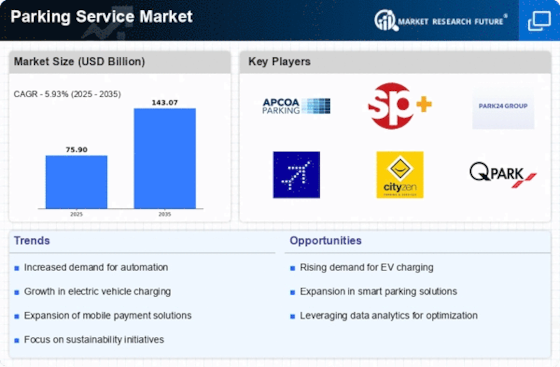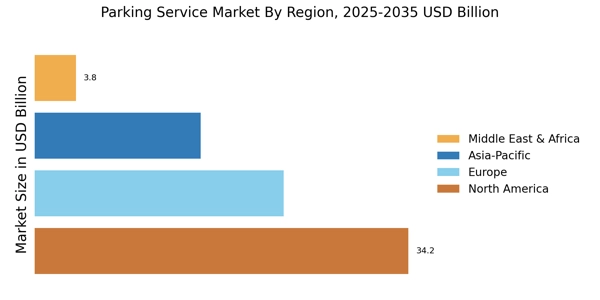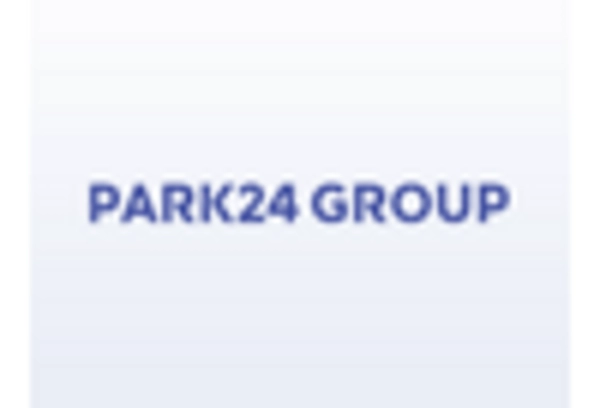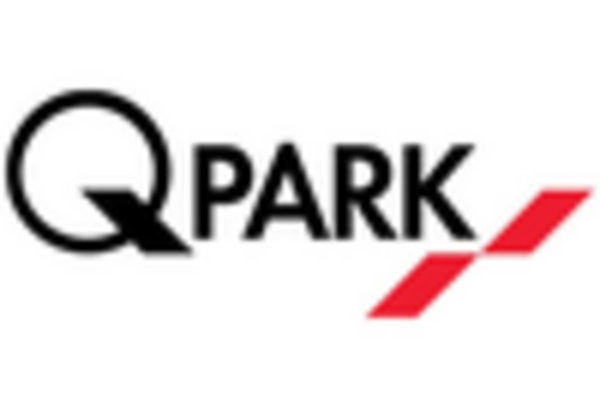Technological Advancements
The Parking Service Market is experiencing a notable transformation due to rapid technological advancements. Innovations such as mobile applications, automated parking systems, and real-time data analytics are enhancing user experience and operational efficiency. For instance, the integration of Internet of Things (IoT) devices allows for seamless communication between vehicles and parking infrastructure, optimizing space utilization. According to recent data, the adoption of smart parking solutions is projected to increase by over 30% in the next five years, indicating a strong shift towards technology-driven services. This trend not only improves convenience for users but also aids operators in managing resources more effectively, thereby driving growth in the Parking Service Market.
Urbanization and Population Growth
Urbanization and population growth are pivotal factors influencing the Parking Service Market. As cities expand and populations increase, the demand for parking spaces intensifies. It is estimated that urban areas will house approximately 68% of the world population by 2050, leading to a surge in vehicle ownership and, consequently, parking needs. This demographic shift necessitates the development of more efficient parking solutions to accommodate the growing number of vehicles. Furthermore, municipalities are increasingly investing in infrastructure to support this demand, which is likely to propel the Parking Service Market forward. The interplay between urban planning and parking services is crucial, as cities strive to balance accessibility with sustainability.
Government Regulations and Policies
Government regulations and policies play a significant role in shaping the Parking Service Market. Many regions are implementing stricter regulations aimed at reducing traffic congestion and promoting sustainable transportation. For example, policies that encourage the use of electric vehicles often include incentives for the development of dedicated parking spaces. Additionally, zoning laws are evolving to integrate parking solutions into new developments, ensuring that adequate facilities are available. These regulatory frameworks not only enhance the attractiveness of parking services but also stimulate investment in infrastructure. As governments continue to prioritize sustainable urban mobility, the Parking Service Market is likely to benefit from increased funding and support.
Consumer Preferences for Convenience
Consumer preferences for convenience are reshaping the Parking Service Market. As individuals seek more efficient and user-friendly parking options, services that offer features such as reservation systems, contactless payments, and real-time availability updates are gaining traction. Recent surveys indicate that over 70% of consumers prioritize convenience when selecting parking services, highlighting a shift in expectations. This trend is prompting parking operators to enhance their offerings, integrating technology to streamline the parking experience. The emphasis on convenience not only attracts more users but also fosters customer loyalty, which is essential for sustained growth in the Parking Service Market. As consumer demands evolve, the industry must adapt to remain competitive.
Rise of E-commerce and Delivery Services
The rise of e-commerce and delivery services is significantly impacting the Parking Service Market. With the growing trend of online shopping, there is an increasing need for efficient delivery logistics, which often requires designated parking areas for delivery vehicles. This shift is prompting businesses to rethink their parking strategies, leading to the development of specialized parking solutions that cater to delivery services. According to industry estimates, the demand for last-mile delivery solutions is expected to grow by 20% annually, further driving the need for optimized parking facilities. Consequently, the Parking Service Market is adapting to these changes, creating opportunities for innovative parking solutions that accommodate the evolving landscape of commerce.

















